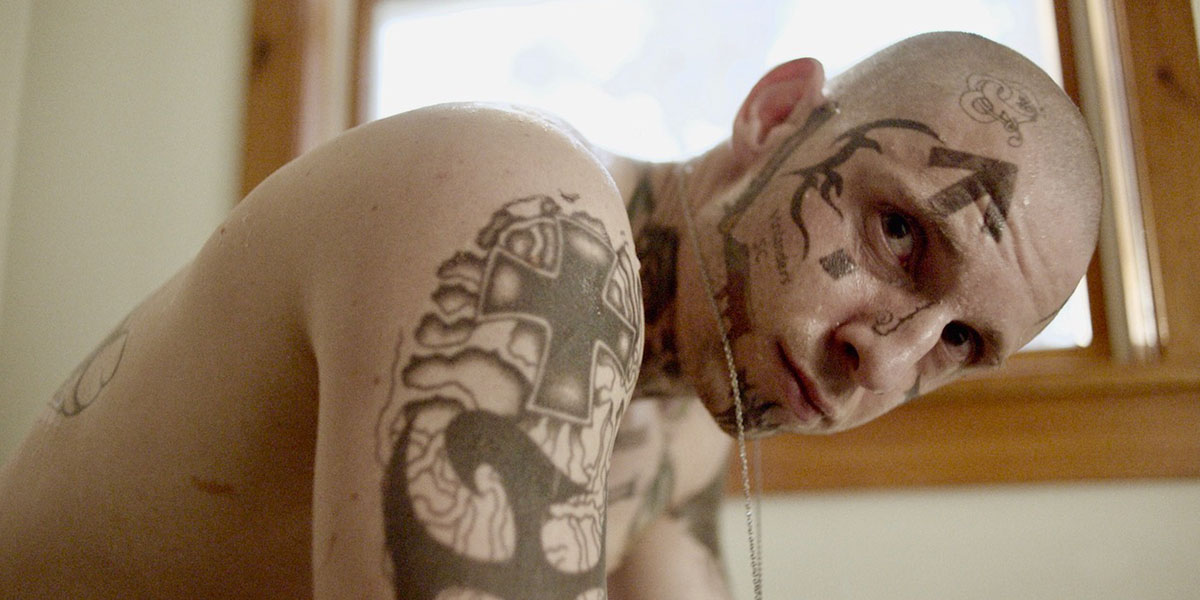Toronto Film Review: Jamie Bell in ‘Skin’
By Dennis Harvey
LOS ANGELES (Variety.com) – When “American History X” came out 20 years ago, part of its appeal was exotic. At the time, Neo-Nazis still seemed an outlandish, subterranean believe-it-or-not element in society. But the fact-inspired “Skin” arrives in a very different landscape, where white supremacists are coming out of the woodwork — running for political office, mainstreaming their rhetoric, providing “dog whistles” to the faithful on national TV.
Israeli director Guy Nattiv’s first U.S. feature is based on the experiences of one Bryon Widner, who gained attention (and was the subject of a 2011 documentary, “Erasing Hate”) for breaking from his white-power background and having the related tattoos that covered his body (and face) removed at tortuous length. Played by Jamie Bell — with a major assist from “makeup, tattoos, and prosthetic designer” Stevie Bettles — Widner’s story here is essentially one of painful tie-severing from an unhealthy subculture, with limited insight into that culture itself. It’s a narrow treatment of a now pressingly relevant subject, but one that still rewards as a powerful, well-acted tale of personal redemption.
First met leading the charge when his “brothers” clash with anti-fascist demonstrators in 2005 Columbus, Ohio — and facially mutilating one young black man he corners in an alley — Bell’s Byron is the golden boy of a “Viking” skinhead group headed by Fred “Hammer” Krager (Bill Camp) and wife Shareen (Vera Farmiga). This couple treat Byron as their own son, when in fact he’s just another vulnerable stray from a dysfunctional family that they picked up, gave a “family,” and groomed for participation in white supremacist activities — which seem to consist largely of sex, booze, and rock ’n’ roll. Plus, of course, the occasional harassment of those outsiders they perceive as being less-than-pure.
But Byron, aka “Babs,” who’s also a talented professional tattoo designer, has flickers of conscience and discontent. When he becomes involved with Julie (Danielle Macdonald), a tough young mother of three girls, she refuses to let them be around the violent racists that used to comprise her social environment, too. So Byron must make a choice. But the Kragers aren’t inclined to make that severance easy for any of them, least of all their “son.”
Punctuated by glimpses of the protagonist’s subsequent full-body tattoo removals (procedures that took nearly two years), Nattiv’s script focuses on a long, difficult exit toward some kind of “normal” life. There are no flashbacks to Widner’s earlier days, though the film does supply a composite-figure homeless teen (Russell Posner as Gavin) whose recruitment by the Kragers probably mirrors Bryon’s own years before.
The primary focus is on Byron’s stormy but durable relationship with Julie and her daughters, who’ve had bad men in their lives before but are willing to let him prove he’s not another. A more long-distance positive influence is Mike Colter’s Daryle Jenkins, a black activist involved in “turning” hate-group members into cooperative government witnesses with new identities and values. (Mary Stuart Masterson portrays the chief federal agent interviewing Widner.)
Less dynamic than “American History X,” and less lurid than some treatments of similarly themed stories, “Skin” is a compelling character study whose narrative momentum flags somewhat around the three-quarter point. Still, it never loses interest. Bryon’s internal evolution is the real drive here, though as we only meet him after he’s already ready (however unconsciously) to leave the Kragers’ “family,” that remains something of an enigma.
Bell is a fine actor who submerges himself in the role, and if we’re not quite sure what makes Bryon tick, perhaps it’s because we’re witnessing him in the process of just beginning to decide what sort of person he really wants to be. While there’s not much attention paid to the rhetoric and strategies of the movement he’s detaching himself from, the fate of several immigrant workers late in the going remind us that these organizations are far from harmless vehicles for white “pride.”
Macdonald is very good as a more hardened graduate of the school of hard knocks than her protagonist in “Patti Cake$,” and there are strong supporting performances down the line. Camp convinces as the steely (but also vain and smug) leader of the “Vinlanders Social Club.” Yet it’s Farmiga’s creepily sexual “Ma” who really appears to be running the show in a milieu where women otherwise seem marginalized and abused.
Onscreen names identify a series of otherwise interchangeably depressed heartland locations where such groups tend to find disgruntled ready recruits. The tech and design contributions are sharp, with Dan Romer’s original score unafraid to try some very different musical textures to underline the strangeness and tension of the journey depicted.

